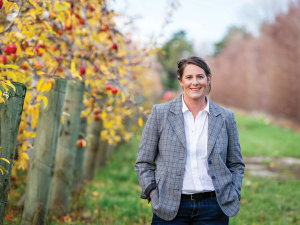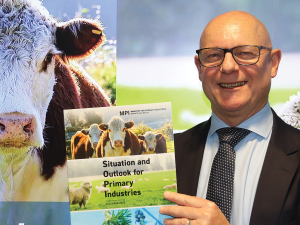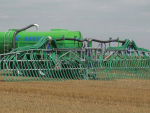Three years of planning and work has come to fruition in the launch last week of Beef + Lamb New Zealand’s brand promotion Taste Pure Nature.
Speaking at the BLNZ annual meeting in Timaru, marketing manager Nick Beeby said the launch of the Taste Pure Natural brand in California was a “very exciting day for the NZ meat industry”.
Beeby says consumers today are suffering from ‘food anxiety’ – driven by environmental and animal welfare concerns. This has led many to look at meat substitutes such the Impossible Burger and other protein alternatives.
“A lot of these concerns stem from more industrialised production methods such as factory farming. That’s not the way we farm. If we don’t want to be affected by these trends, then we need to tell our story to consumers better,” he explained.
“Consumers are wanting to connect back to ‘real food’ -- the kind of food their grandparents ate.”
Beeby says the NZ meat industry’s future lies in driving a higher premium for our products.
“We can’t and don’t want to feed the world. Our research shows that country/place of origin is a primary tool used by consumers, retailers and foodservice to decide where to buy their products from. Origin branding is also a platform off which greater value can be driven.
“With our natural assets and farming systems, NZ is strongly positioned, at an origin level, to establish a level of trust and loyalty with consumers that can’t be replicated by other countries.”
He says the idea behind Taste Pure Nature is to use it as a global brand platform to enhance the positioning of NZ beef and lamb.
“Taste Pure Nature will provide a marketing umbrella to support NZ exporter brand building activities.”
Beeby explained that research by BLNZ found that NZ’s image as a country in our overseas markets is positive, but weak in relation to red meat.
“There is very little knowledge about our natural grass fed, hormone free, antibiotic free farming methods.”
He says NZ as ‘a country of origin’ for beef and lamb can give consumers a level of assurance they are looking for.
“There is growing demand for grass-fed, hormone free, antibiotic free red meat that consumers are willing to pay a premium for. Our farming naturally fits in this category, but we are currently not capitalising on the opportunity.”
Beeby says underpinning the brand is BLNZ’s environmental strategy, which incorporates environmental and animal welfare assurances.
“We have to back up our claims so consumers see that we are walking the talk.”
The Taste Pure Nature brand is now being piloted in two markets – China and the US. Beeby says it will help build demand, visibility and experiences for NZ beef and lamb through in-market promotion of Taste Pure Nature to key distributors, foodservice and retail channels and consumers.
Meat companies signed up so far with the new brand includes The NZ Lamb Company (a JV between Alliance Group, Silver Fern Farms and Anzco), Atkins Ranch, Angus Pure and Coastal Lamb.
What’s a ‘conscious foodie’?
Beeby says one reason California was chosen for the launch is because Australia has been winning against NZ chilled meat exports in the US market.
He says BLNZ is confident the Taste Pure Natural brand will lift the amount of NZ beef and lamb being sold in California where Australia is now outselling NZ by a factor of 20.
A key target consumer in this market is what BLNZ research calls the ‘conscious foodie’ -- consumers who care where their food comes from, look beyond price, reject factory farming and are mindful of the environment and animal welfare issues.
Beeby concedes this campaign demands a long-term commitment: it will be some time before BLNZ levy payers will see any benefit.
“Market development is a long-term investment, so we do not anticipate seeing change in the first few years.
“BLNZ will be working with meat companies to put a strong framework around the origin brand and story to ensure we monitor and measure and adapt the programme as necessary.”



















